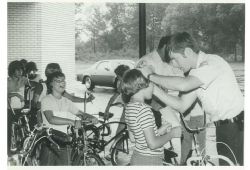A
nine-year-old boy lay in his parents’ bed.
He should have been in school that day, but he wasn’t. He was ill, and had been for some time. The paramedics arrived in a hurry, but they
hadn’t come there for him. They had come for the man lying next to him,
his father. The boy heard the paramedics say to his distressed mother, “There
is nothing we can do.” The boy’s father, a former Mountie and successful
businessman, was dead. It was a heart
attack. As one life ended, another was
just beginning.
The
young boy could not have known that the untimely death of his father was to
shape and mark his life in a profound way.
It was this moment that set into
motion a kaleidoscope of events and circumstances that were to teach him
humility, loyalty, perseverance, and the value of hard work. It was 1959, and the young boy’s name was
Marc Demers.
Early Days
The
1950’s were a time of great change around the world, and Montreal was no
different. The early 1950’s saw the population of Montreal grow by 35 per cent,
rock n’ roll was taking music by storm, buses began to replace streetcars in
the city center, and the Queen Elizabeth Hotel was under construction. In a Montreal neighbourhood near rue Jarry in
August of 1951, Marc Demers was born, one of five children in his family.
The
Demers family had a relatively good life in those days. Mr. and Mrs. Demers
were the owners of a private detective agency based in Montreal. Mrs. Demers, despite having her hands full
with five children, worked alongside her husband in the business, an unusual
scenario for a wife and mother at that time. Mr. Demers had been a Mountie, but
as Marc was told, his father left the Mounties because at that time there was
rule that Mounties could not marry for five years. Mr. Demers chose to marry
right away instead, and together he and his wife founded the detective
agency. The family spent summers at
their vacation home in Oka, and Marc has fond memories of his early childhood
during that time.
A
red horse named Rusty, a dog named Buster, plenty of siblings to play with, a
father with a sense of humour who enjoyed playing practical jokes…all the trappings
of happy family life. It all changed dramatically
after the death of Marc’s father.
Mrs.
Demers was not able to keep the business going after her husband passed away,
not because she didn’t have the will or the skill, but in part due to a series
of unfortunate incidents in the period that followed. The family’s financial stability was lost,
and eventually the business folded and the family was bankrupt. A single mother raising five children would
be hard enough in today’s world, but
in 1959, the scenario was dire, with women making up less than 30 per cent of
the workforce. Times were tough; even
tougher for widowed women.
“My
mother could have given us away or split the children up for adoption as orphans,
as was common at the time for single or widowed mothers, but she refused,”
explains Demers. “My aunt had offered to adopt me, but my mother said no. She wanted to keep us all together.” Demers recalls the family losing their house
as well as the summer home in Oka. They then
lived in rented apartments, sometimes lodgings that were designed for summer
use only.
“It
was challenge to heat those places in the winter,” says Demers. The family received help from food baskets
and social assistance. It was a far cry
from the privileged lifestyle the family had been accustomed to in the early
1950’s. “My mother went from being a successful businesswoman to losing
everything and having five children to feed and clothe by herself,” says
Demers.
Education &
Formative Years
Due
to the constant moving to seek out cheaply-priced apartments, young Demers was
often the “new kid” in school at least twice a year. In each new school that he attended, he found
himself seeking out students that were bullied or picked on, and defended them.
“I just wanted to help them, but this resulted in me getting into a lot of
fights at school and I got a certain reputation!” recalls Demers.
Though
he may have gotten a reputation for fighting, it might have been an early sign
of adopting the motto “to serve and protect”—Demers eventually became a police
officer around the age of 20.
The
Demers family moved to Laval in 1967, primarily for the reduced rent cost, and
again, their first lodging was a summer home, which was not designed for use in
the winter. Demers attended École
secondaire St-Maxime, and during that time, he discovered that he was good with
numbers, and originally wanted to become an actuary. At 16 years old, he needed
to help his mother financially, so he began working at an Esso gas station on
boul. Sauvé in Laval-Ouest four evenings a week.
First,
he pumped gas, but soon began to learn car mechanics. A teenaged Demers was so financially strapped
(giving his entire paycheck to his mother to help feed the family), that he
often had to wear his Esso uniform to school because he had no other
clothes. He completed his final high
school year at École secondaire Mont-de-La Salle.
Demers
was then offered a full-time position at an Esso station in Ste-Thérèse. “I
accepted the job because we really needed the money,” says Demers. Despite not
having any formal training, his boss at the gas station saw potential in
teenaged Demers, and before long, promoted him to manager. Now 18, Demers wanted to attend
post-secondary studies but needed to work, so he took a few courses here and
there at CEGEP St-Laurent and tried to make his schedule fit around his work
hours. “Though it was a hard time trying
to balance all of that, I was lucky to meet my future wife at that time,” he
says. He and Jeanne D’Arc Bélisle met
through school friends, and have been together ever since. That was in May of
1971. One month later, Demers found
himself in police training, something he had not even considered only a few
weeks prior!
30 Years of
Service to Laval Police
As
he tells it, Demers had not planned on becoming a police officer, but a
neighbour who was a local police officer suggested that he try out for it
anyway, because the city was recruiting and needed officers. At the insistence of his mother, and to
please her, Demers took the required evaluation and physical tests, and to his
surprise, days later he was offered a position.
“I was really surprised because I came to sports and athletics late in
life,” he says. “But they were offering
me the job and I was supposed to start training the following week!”
Demers
then went through a rigorous training program, but true to his father’s nature
of playing practical jokes, he found a way to make the harsh military-style
training a little less serious. Demers
recalls making a deal with one of his friends in training who was often getting
into trouble with the superiors. “I told
my friend that every time he gets a sanction,
I will do something to get one as well, so we would both have the punishment
together,” he explains. “Since I didn’t
drink or smoke, whenever the guys would go out once a week, I’d have a Coke or
7-Up, but come back to the training camp pretending
to be drunk, so that I would get into trouble,” chuckles Demers. A common
punishment for Demers at that time was to run for one hour every evening after
supper, in addition to all of the other physical training in the police program.
Demers’s
first assignment as a Laval Police officer was in December of 1971. He was
assigned to the Chomedey station and his job was to take the emergency
responder calls in the ambulatory department, in addition to his regular tasks
as an officer. He kept this role for
seven years before during which time he launched a new youth city day camp, an
innovative project at that time.
The
goal of the program was to bring in young boys aged 12-18 whom Demers had
previously arrested, so that they could train and play sports instead of being
on the streets causing trouble. “We weren’t making any money from this
effort—we were all working for free—so that we could help the children.”
Demers
was then put on patrol in the aide à la jeunesse sector in Chomedey, and was the
only officer who could speak English, making him more accessible to the English-speaking
youth in that area. Demers also became involved with the police union as the
Vice-President, and worked on negotiations for the ten years that followed.
Following
this period, Demers was promoted to Sergeant at Station 2, and during this
time, stories of the Vaillancourt administration’s illegal activities were
beginning to surface. Demers took it
upon himself to investigate and bring his findings to the Sûreté du Québec, and
his findings eventually led to the Commission Poitras. According to Demers, his investigation of the
Vaillancourt administration did not do his career any favours. “Technically, as a police officer, Mr. Vaillancourt
was my boss,” explains Demers. As Demers notes, he was then demoted for several
years, brought to court (presumably to remove the possibility of him
investigating any further), before finally being named Sergeant Detective.
He
was assigned to fraud investigation, and this put him once again in the path of
the Vaillancourt administration’s activities. Following a long investigation,
the case was again dropped under complex circumstances, and Demers was then
transferred to murder investigation.
Family Life
Demers
married Bélisle and the couple went on to have three children, two daughters
and a son. Emulating the happy days of
his early childhood, Demers recalls a lot of amusing camping trips with his own
children when they were young, most notably a time when the family came face to
face with a large bear!
At
work and at home, Demers admits to being a practical joker like his father was.
“I like to tease or play tricks, but only on those I love,” laughs Demers. These days, Demers enjoys spending time with
his six grandchildren.
New Beginnings
Following
his retirement as detective for the Laval Police in 2001, Demers founded his
own detective agency with his older sister Andrée. It a way, the brother and sister duo were
following in their parents’ footsteps as they operated Demers Pro Services. “When
I started it, I had no idea we would be so successful,” says Demers. His company mainly dealt with fire insurance
fraud. “At one point, we had so many
clients wanting to give us contracts that I actually had to turn down work just
about every week.” He operated the
company for 12 years, until the call to public service came once again, this
time in municipal government.
Demers
was asked three times to run for Mayor by David De Cotis, who founded the
current party in power, and finally accepted to run in the election of
2013. Following a brief time in
provincial politics, Demers set his sights on municipal government.
Breathing New Life
into Laval
As
Mayor of Laval, Demers has continued to thrive on the ability to serve others.
“When I was a police officer, I would be in contact with youth who were going
down the wrong path,” says Demers. “I
was able to steer them in the right direction with the youth sports program I
created, and that’s also why the idea of creating the Fonds Place-du-Souvenir
came to me.”
Demers
feels that giving the funds recuperated from the previous administration’s
corruption to underprivileged youth would be the most noble way to use it,
thereby assisting in alleviating social inequity in the city. The Fonds
Place-du-Souvenir is an amount of ten million dollars of which the interest
will be dispersed to various youth causes annually; six hundred thousand
dollars a year.
“I
sincerely believe that our institutions have the power and the responsibility
to intervene and help those in need,” says Demers. “We have to aim for a
balanced distribution of resources. The
city must create favorable conditions for free enterprise, but must also
intervene to help shape best practices.” Demers points to the city’s social
housing projects as an example.
Demers
has much to be proud of in the way of improvements to the city in his first
mandate as Mayor. Free public transport
for all senior citizens (credit for that idea goes to Mrs. Demers), renovations
to parks, arenas, and community centers are under construction at press time,
just to name a few. With the opening of Place Bell on the horizon, Demers and
his team’s vision of a bustling city center is coming to fruition. “Our
partnership with Place Bell is a very balanced one,” says Demers. “The
merchants can do good business and the families of Laval will have access to
dedicated rinks for amateur sports.”
With
his first mandate coming to a close, Demers is confident that his team have put
every effort forward to make Laval a city its citizens can be proud of. He
points to his team’s strategic and modern management of city operations. “In
the end, it’s the citizens who benefit. They are now getting more for their
dollars,” says Demers. Laval citizens
saw an average of only 1.63 percent tax increase annually during this mandate.
“I’m
proud and impressed with the work done by our team of councillors,” says
Demers. “Public service has been completely transformed, and Laval is
absolutely gaining momentum.”
No
one could have predicted back in 1959 that a young boy in mourning over his
father’s death would go from hot summer days riding Rusty into the fields of
Oka, towards a winding path of fighting crime, catching bad guys and lifting
the fog of corruption from an entire city.
One
is reminded Marvel comics storylines that are now Hollywood blockbusters.
Perhaps the “Superheros of Laval” will make their way onto a big screen near
you, but for now, stay tuned.

 In The Latest Issue:Latest Issue:
In The Latest Issue:Latest Issue:
- A Bittersweet Farewell
- The new Laval Aquatic Co...
- The End of an Era:
Articles
Calendar
Virtual- ANNUAL TEACHER APPRECIATION CONTEST
- APPUI LAVAL
- ARTS & CULTURE
- CAMPS
- CAR GUIDE
- CCIL
- CENTENNIAL ACADEMY
- CHARITY FUNDRAISING
- CITYTV
- COSMODÔME
- COMMUNITY CONNECTIONS
- COVER STORY
- DINA DIMITRATOS
- ÉCOLE SUPÉRIEURE DE BALLET DU QUÉBEC
- EDITORIALS
- ÉDUCALOI
- EDUCATION
- EMPLOYMENT & ENTREPRENEURSHIP
- FÊTE DE LA FAMILLE
- FÊTE DU QUARTIER SAINT-BRUNO
- FAMILIES
- FESTIVAL LAVAL LAUGHS
- FÊTE DE QUARTIER VAL-DES-BRISES
- FINANCES
- GLI CUMBARE
- GROUPE RENO-EXPERT
- HEALTH & WELL-BEING
- 30 MINUTE HIT
- ANXIETY
- CHILDREN`S HEALTH & WELLNESS
- CLOSE AID
- DENTAL WELLNESS
- EXTREME EVOLUTION SPORTS CENTRE
- FONDATION CITÉ DE LA SANTÉ
- GENERAL
- HEARING HEALTH
- MESSAGES FROM THE HEALTH AGENCY OF CANADA
- MENTAL HEALTH
- SEXUALITY
- SOCIAL INTEGRATION
- SPECIAL NEEDS
- TEENS
- THE NUTRITION CORNER
- THE NUTRITION CORNER - RECIPES
- VACATION DESTINATION
- WOMEN'S FITNESS
- WOMEN'S HEALTH
- HILTON MONTREAL/LAVAL
- HOME & GARDEN
- INTERNATIONAL WOMEN'S DAY
- JAGUAR LAVAL
- LAVAL À VÉLO
- LAVAL FAMILIES TV SHOW
- LAVAL FAMILIES MAGAZINE CARES
- LAVAL URBAN IN NATURE
- LE PARCOURS DES HÉROS
- LES PETITS GOURMETS DANS MA COUR
- LEON'S FURNITURE
- LEONARDO DA VINCI CENTRE
- LFM PREMIERES
- LIFE BALANCE
- M.P. PROFILE
- MISS EDGAR'S AND MISS CRAMP'S SCHOOL
- MISSING CHILDREN'S NETWORK
- NETFOLIE
- NORTH STAR ACADEMY LAVAL
- OUTFRONT MEDIA
- PASSION SOCCER
- PARC DE LA RIVIÈRE-DES-MILLE-ÎLES
- PÂTISSERIE ST-MARTIN
- PIZZERIA LÌOLÀ
- PLACE BELL
- PORTRAITS OF YOUR MNA'S
- ROCKET DE LAVAL
- SACRED HEART SCHOOL
- SCOTIA BANK
- SHERATON LAVAL HOTEL
- SOCIÉTÉ ALZHEIMER LAVAL
- STATION 55
- STL
- SUBARU DE LAVAL
- TECHNOLOGY
- TEDXLAVAL
- TODAY`S LAURENTIANS AND LANAUDIÈRE
- TODAY`S LAVAL
- WARNER MUSIC
- THIS ISSUE
- MOST RECENT
Magazine
Mayor Demers: The Untold Story
Articles ~e 105,7 Rythme FM 4 chemins Annual Teacher Appreciation Contest Appui Laval Arts & Culture Ballet Eddy Toussaint Camps THIS ISSUE MORE...
CONTESTS Enter our contests
CONTESTS Enter our contests
CALENDAR
Events & Activities
COMMUNITY Posts Events
PUBLICATIONS Our Magazine Family Resource Directory
LFM BUSINESS NETWORK Learn more
COUPONS Click to save!
COMMUNITY Posts Events
PUBLICATIONS Our Magazine Family Resource Directory
LFM BUSINESS NETWORK Learn more
COUPONS Click to save!
SUBSCRIPTIONS
Subscribe to the magazine
Un-Subscribe
E-NEWSLETTER Subscribe to our E-newsletter Un-Subscribe
WRITE FOR US Guidelines & Submissions
POLLS Vote today!
E-NEWSLETTER Subscribe to our E-newsletter Un-Subscribe
WRITE FOR US Guidelines & Submissions
POLLS Vote today!
ADVERTISERS
How to & Media guide
Pay your LFM invoice
SUGGESTIONS Reader's Survey Suggest a Listing
LFM About Us Our Mission Giving Back Contact Us
SUGGESTIONS Reader's Survey Suggest a Listing
LFM About Us Our Mission Giving Back Contact Us
 PICK-UP LOCATIONS
Get a copy of LFM!
PICK-UP LOCATIONS
Get a copy of LFM!
TERMS & CONDITIONS Privacy | Terms
ISSN (ONLINE) 2291-1677
ISSN (PRINT) 2291-1677
Website by ZENxDESIGN






Tweet
Share